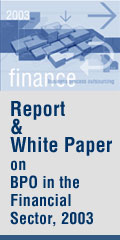|


|
Global real credit growth to halve this year
October 21, 2008:
Fitch Ratings says the global credit crunch will result in a halving of global real credit growth this year as the global financial system continues to de-leverage, risk aversion increases and the global economy slows.
In its latest semi-annual "Bank Systemic Risk report" issued today, Fitch forecasts real credit growth will halve to 7% by the end of this year and slow further to nearer 5% next year, after having peaked at almost 16% in 2007. The slowdown will continue to be most pronounced in emerging Europe (EE) but will spread to all regions. Fitch forecasts Latin American credit growth to slow sharply. In contrast, the slowdown in the Middle East and Africa and Asia is forecast to be less pronounced.
In the three years since this semi-annual report was introduced in 2005, an increasing number of countries have moved into higher-risk categories on Fitch's Macro-Prudential Indicator (MPI) scale, reflecting strong credit growth and, in some cases, strong asset prices and real exchange rate appreciation. As the global financial crisis broke last year, over 60% of the 86 countries covered exhibited "moderate" or "high" indications of potential banking system stress, including 80% of the developed world and most of EE and the Gulf.
A number of factors are now coming together to slow credit growth. First and foremost, the global financial system is de-leveraging. Of the 20 countries experiencing the biggest increase in credit/GDP in 2006-2007, virtually all are in the developed world and EE, where most financial stress has occurred so far. And all five countries with the biggest deviations from trend of credit/GDP and real property prices - Iceland, Ireland, Denmark, Spain and the UK - have experienced varying degrees of banking system stress over the past year.
Risk aversion has increased, especially risk aversion between banks, and is the main reason for the domino effect of successive developed-country bank failures and takeovers in the past month, prompting official intervention in an increasing number of countries. It also partly explains the liquidity problems of some emerging-market banking systems. Stresses will persist as external funding - whether from banks or capital markets - becomes more difficult and expensive to access. EE may be at an advantage here, as high foreign ownership makes external funding more reliant on parent/subsidiary flows. However, there is increasing evidence of attempts to tighten lending criteria where there is the prospect of a hard landing, notably in the Baltics.
Last but not least, the global economy is slowing, with some EU countries entering recession and one looming in the US. Fitch has always been sceptical of the de-coupling argument and expects most emerging market economies to slow in the year ahead. This will exacerbate banking system problems as asset quality deteriorates in a more traditional cyclical fashion.
As regards the leading indicators of systemic stress monitored in the Fitch report, as global credit growth slows, fewer new candidates are likely to be flagged for potential stress. Attention instead has moved to the resolution of actual banking crises and their costs to the sovereign. These topics are beyond the scope of this report and are covered in other Fitch reports. Fitch will review the performance of its bank systemic risk indicators in light of the evidence from this year's widespread banking turmoil. Since the April report was published, the Banking System Indicator (BSI) for a number of developed country systems has deteriorated, leaving no country in the strongest category.
(This is press release of Fitch Ratings)
CLICK FOR SPECIAL SECTION ON GLOBAL FINANCIAL CRISIS
Government measures should stabilize global banking markets
IMF Welcomes Comprehensive European Response to Financial Crisis
IMF sees heightened risks to global financial stability
Global banking industry to see more restructuring & consolidation
Indian Banking sector challenged by domestic, not global, factors
Indian banking system is stable and sound, says RBI Governor
Indian Government sets up group to assess liquidity requirements
US Financial Crisis to indirectly impact Asian banks
Limited impact on Asia-Pacific banks from Lehman bankruptcy
Broader Implications of Lehman bankruptcy and Merrill Lynch acquisition
Subprime Crisis: A Special
CLICK FOR MORE FEATURES & STORIES

|
|
|